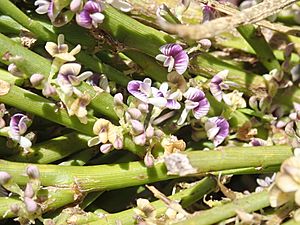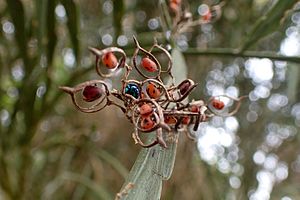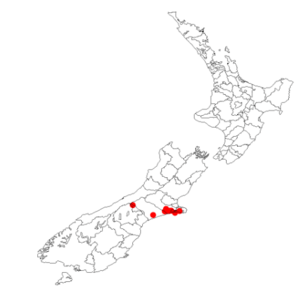Carmichaelia appressa facts for kids
Carmichaelia appressa, also known as the prostrate broom, is a special type of pea plant. It belongs to the Fabaceae family, which includes many plants like beans and peas. This plant grows only in the South Island of New Zealand. It's considered "At Risk - Naturally Uncommon," meaning it's not very common in nature.
Quick facts for kids Carmichaelia appressa |
|
|---|---|
 |
|
| Stems lying flat & flowers | |
 |
|
| Seeds still held by the plant | |
| Conservation status | |
|
Invalid status (NZ TCS)
|
|
| Scientific classification | |
| Kingdom: | |
| (unranked): | |
| (unranked): | |
| (unranked): | |
| Order: | |
| Family: | |
| Genus: | |
| Species: |
C. appressa
|
| Binomial name | |
| Carmichaelia appressa G.Simpson
|
|
 |
|
| Occurrence data from AVH | |
What it Looks Like
The prostrate broom is a unique plant that spreads out flat on the ground. It has many branches that grow close together. These branches form round, flat shapes that can be up to 2 meters wide. The plant stays very close to the earth. It produces its flowers during the summer months.
How it Got its Name
This plant was first officially described in 1945 by a botanist named George Simpson. He collected a special sample of the plant in 1938. This sample, called a lectotype, helps scientists identify the species. He found it at Ellesmere Spit in the Canterbury area.
Where it Lives
The prostrate broom likes to grow on "shingle beaches." These are beaches made of small, smooth stones, and they are very close to the sea.
 | John T. Biggers |
 | Thomas Blackshear |
 | Mark Bradford |
 | Beverly Buchanan |

